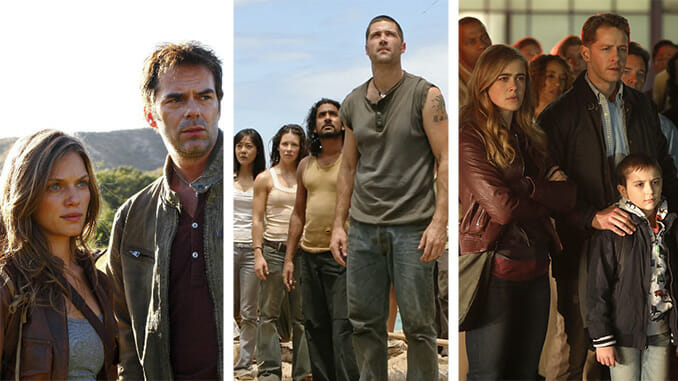The Tired Legacy of Lost
We don't have to go back, actually.
Photos Courtesy of ABC and NBCUniversal
Much like their featured protagonists, TV shows can either die a hero, or live long enough to become the villain.
The mid-2000s were undeniably one of the most noteworthy periods of all time for television. Shows like Grey’s Anatomy, Heroes, and The Office all got their starts between 2004 and 2006. Premiering alongside them was Lost, the iconic ABC series created by Jeffery Lieber, J.J. Abrams, and Damon Lindleof. The series was incredibly influential not only on television itself but on pop culture as a whole, with Lost’s mainstream cult following preceding the massive popular fandom boom that happened in the mid-2010s.
Simply put, Lost captivated millions of people during its six season run, and while the end of the series was (and still is) incredibly polarizing, it still seared itself into the brains of fanatics and casual watchers alike. Its mark on the landscape of science fiction television is a big one, and while that means the show will likely never fade into obscurity, it also means that the less-great parts of its influence are going to run free for longer than we ever wanted them to.
In the years following the end of the series, the “Lost Clone” was born. These types of shows were maybe not direct copies of Lost, but the influence was there all the same, often for the worse. Whether it’s a group stranded in some sort of remote wilderness, a plane that goes missing for an indiscriminate amount of time, or something that’s even more derivative but still clearly influenced by the mystery box that Lost had cultivated throughout its run, each sought to capitalize on that popular plot structure.
It’s not like the Lost Clone has completely overtaken sci-fi TV in the years since Lost’s cancellation, but it has been a major irritation. You can always pick them out on a crowded dial, and oftentimes it isn’t even worth it to get invested because they are typically canceled before whatever long plot thread they’re chasing after is solved.
Though it may not look like one at first glance, the first show I remember seeing that could fall into this category was Fox’s 2011 drama Terra Nova. The series follows a family as they travel back in time to the Cretacous with a sect of humanity that is charged with trying to prevent the damage that human driven climate change and overpopulation has done. Terra Nova was primarily canceled due to its budget and production challenges, but when stripped down to its baser elements of the tropical setting, time displacement, and overarching mystery of who the Sixers are and what they want, it’s similar enough to Lost that it can be counted as the first of the show’s post mortem lookalikes.
-

-

-

-

-

-

-

-

-

-

-

-

-

-

-

-

-

-

-

-

-

-

-

-

-

-

-

-

-

-

-

-

-

-

-

-

-

-

-

-








































